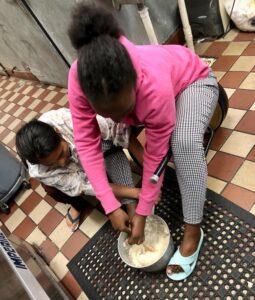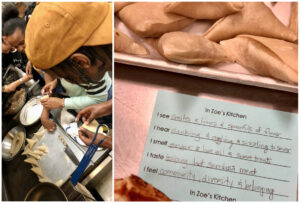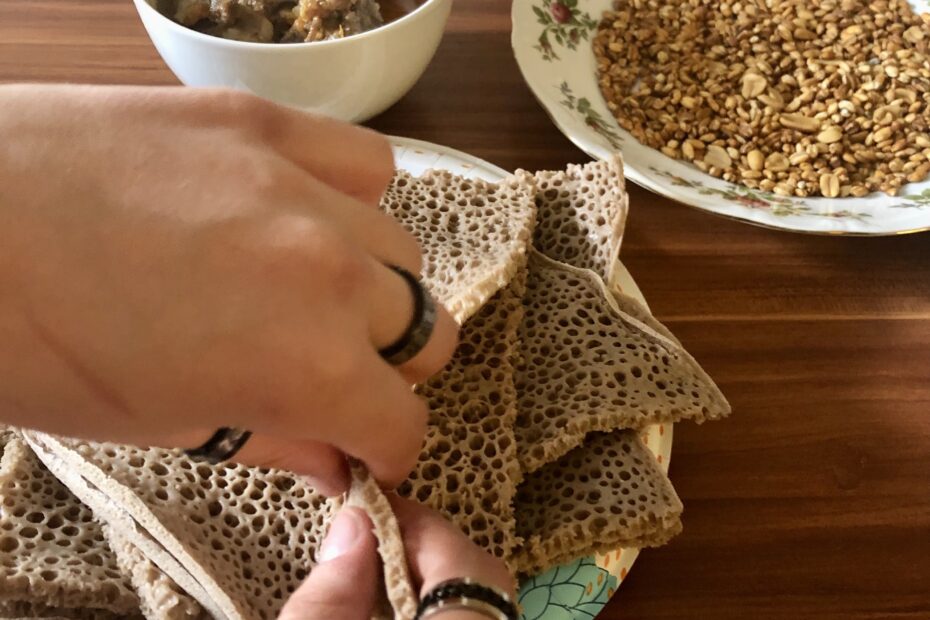…I was hungry and you fed me, I was thirsty and you gave me a drink… Whenever you did one of these things to someone overlooked or ignored, that was me – you did it to me.’ ~Jesus (Mt. 25:35-40)
A Private African Feast
Congolese fufu, Somali sambusas, and Eritrean injera with spicy meat sauce… My friend Kathryn thoughtfully gathered our English Language Learners and the ingredients for our culinary adventure. Our group of about 15 tutors and teens from various refugee backgrounds borrowed a local Café kitchen so three young African women, each from a different country, could teach the rest of us how to fold sambusas and pound cassava flour into fufu–a dough-like substance that you pinch and dip in delicious sauce.
 A teacher by background, Kathryn had astutely noticed that one of the teens in our tutoring group was embarrassed by her struggles with reading. Though this young Somali wrestled with written words, she knew how to navigate culinary success, and welcomed leadership in the kitchen. Our diverse little group was learning to collectively share in each other’s strengths and challenges, and we were all hungry and eager to feast together. It was in the holy spaces amidst this diverse community that I understood Jesus’ loving invitation to break bread with Him.
A teacher by background, Kathryn had astutely noticed that one of the teens in our tutoring group was embarrassed by her struggles with reading. Though this young Somali wrestled with written words, she knew how to navigate culinary success, and welcomed leadership in the kitchen. Our diverse little group was learning to collectively share in each other’s strengths and challenges, and we were all hungry and eager to feast together. It was in the holy spaces amidst this diverse community that I understood Jesus’ loving invitation to break bread with Him.
That’s mutuality… it’s reciprocity. Mutuality acknowledges that we all have something to give, and we all have something to receive.
Taking Communion
I grew up Greek Orthodox, where taking Communion meant that we solemnly lined up to receive warm wine with small pieces of bread mixed in—the transubstantiated Body and Blood of Christ administered by the priest on a golden spoon. 
In contrast, a few years ago, I joined a leadership team for a college ministry at my Evangelical Free Church where we experimented with ways communion could be done. I squirmed a little when I was invited to pray over the elements and offer the Bread and the Cup to others. As a female growing up Orthodox, I never considered that I was qualified to serve in such significant spiritual matters. Our leadership team had graciously invited each person to both receive and give the elements to one another.
 Our communion experiment had a few rules:
Our communion experiment had a few rules:
· No one TAKES communion.
· Anyone can GIVE communion to someone else.
· The end goal is for all to RECEIVE communion.
It was neither solemn nor organized. There were awkward moments and whispered negotiations. But the point was profound: We were all part of the same Body, recognizing our shared hunger and thirst for Jesus’ presence among us.
That’s mutuality… a shared interdependence on one another.
Laying Down Power & Embracing Mutuality
In missions, we tend to categorize ourselves as senders, goers, and receivers. Ethiopian American author and coach, Mekdes Haddis, provides space for missionaries and the receivers of missionaries to discuss some of the harmful effects of Western missionaries, in an effort to move closer to a more globally just approach to missions. She calls for the Western church to lay down power for the sake of mutuality.
In her article, 5 Questions to Ask Yourself Before Going on a Missions Trip, Haddis challenges Western missionaries to rethink some of our strategies in how we serve the Global South as goers. She asks a broader question of the Body of Christ:
“What can the global church do to support one another?“
The response from receiving communities is that,
“They’d like to see empowerment and trust of the local missionaries… when westerners come with aid they come with a desire for power and there are strings attached with their support…”
In the West, we want to steward our resources well. Considering Haddis’ challenge of mutuality from the receiving communities, maybe good stewardship is more about being open-handed with power and support, and less about the assumption that our ways of stewarding are best for everyone. In cultures where people value community contribution, we have so much to learn.
Let’s be humbled in our position of power and privilege and take more time to receive… receive feedback on our impact, receive learning from the ways other people do things, or even receive a meal that takes time to make and enjoy in community.
I’m struck by the idea that the Messiah never hosted a dinner party. He always found ways to be on the receiving end of an invitation. Although, the cross was His public invitation—the breaking of His body and the shedding of His blood. We are all receivers there. When we share food with other hungry humans and drink with other thirsty humans, we meet Jesus in those spaces.
That’s mutuality… where we are all equally in need of redemption. We are all invited to come hungry and thirsty.

Hidden Treasure in Diaspora
What a privileged position we are in as receivers of immigrants and refugees in Diaspora. What could get overlooked or ignored is actually hidden treasure—the pleasure of breaking bread—or pinching fufu—with our neighbors.
As English Language Learners, my teenage friends—the ones I learn to cook with, who teach me to eat with my hands, pinch and dip injera, and let fufu slip down my throat, have present challenges that look like deficiencies. Sometimes they skip school because they need to interpret for their parents at banks and doctors’ offices. Sometimes they need rides to soccer practice and help with reading. But the kids I have the privilege of sharing private African feasts with are resilient, bilingual, culturally adaptable… I know because I help them craft incredible resumes so they can acquire summer jobs–one of the many ways I receive glimpses into the strength of their characters.
As Westerners, let’s treasure the privilege of being on the receiving end of potential global leaders from so many tribes and nations. Let’s receive them well. Let’s empower them, learn from them, celebrate them, and send them out to be influencers around the globe and in the global church.
That’s mutuality… breaking all kinds of bread together.

Thank you for such a creative blog! wonderful ideas.